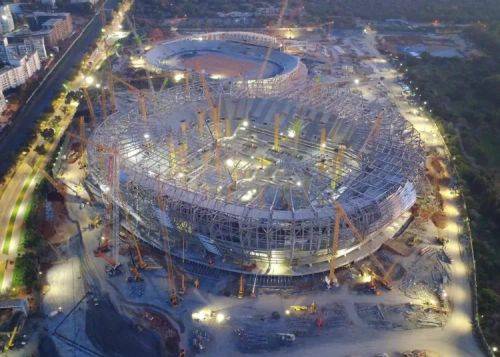Morocco Speeds Up 120 Infrastructures for AFCON 2025
With Morocco preparing to host the 2025 Africa Cup of Nations (AFCON), the country is fast changing. With months to go before the tournament kicks off in December 2025, authorities are accelerating the completion of 120 projects across six major cities. The upgrades are not just to ensure the tournament is a success, but also part of a longer-term plan to co-host the 2030 FIFA World Cup with Spain and Portugal.
Stadium Upgrades and New Constructions
At the heart of Morocco's preparation is an ambitious plan to overhaul nine large stadiums. Rabat, Casablanca, Tangier, Fez, Agadir, and Marrakech will all host AFCON matches, with Rabat hosting four venues alone. The Complexe Sportif Prince Moulay Abdellah in Rabat will host the opening match of the tournament, a semi-final, and the final.
Apart from renovations, Morocco is also constructing a new stadium in Benslimane from the ground up. The stadium is being constructed based on FIFA requirements for the 2030 World Cup, demonstrating Morocco's resolve to host world-class sports infrastructure.
Transport and Connectivity Overhaul
To manage the expected arrival of fans, teams, and media, Morocco is prioritizing transport. Among its flagship projects is the extension of its high-speed rail network connecting Tangier, Casablanca, and Marrakech, with the line to be extended to Agadir. These upgrades are intended to reduce host city travel times and improve overall tournament logistics.
Besides, there is the constant improvement of the national highway system. Primary routes in Casablanca are being expanded to allow easier access to Mohammed V International Airport and other major centers. Over 1,200 kilometers of motorways are being renovated to enhance mobility between regions.
Airport Expansion
With thousands of foreign visitors expected, Morocco is also doubling the capacity of its airports. Casablanca airport is being expanded to handle 23.3 million passengers annually. The same is happening in Marrakech and Agadir, with capacities increased to 14 million and 6.3 million passengers annually respectively. All these are to ensure a smooth and efficient entry and exit for all AFCON guests.
Digital and Telecom Improvements
In anticipation of increased digital demand, Morocco is rolling out 5G connectivity across the country. The initial phase targets 25% coverage of the population by 2026, with ongoing rollout through to 2030. Enhanced digital infrastructure will underpin everything from live broadcasts to fan engagement and ticketing systems, ensuring a modern and tech-enabled experience throughout the competition.
Hospitality and Accommodation Boost
In order to host the arrival of teams, officials, and spectators, Morocco is constructing 24 new luxury hotels in host cities. These will serve as official base camps and team residences, with sites chosen according to proximity to training centers and stadiums. In cities like Tangier, efforts are also being made to expand green spaces and overall hospitality infrastructure to make up for past deficiencies in tourist infrastructure.
Government Oversight and Strategic Planning
The Moroccan government is closely monitoring progress of all the AFCON projects. The Prime Minister, Aziz Akhannouch, is coordinating efforts to conform to national objectives and royal directives. A principal financing agreement has been signed with the Deposit and Management Fund (CDG) to fund the renovation and new construction of the stadiums. This synchronization highlights Morocco's earnestness in organizing a successful continental tournament and laying the foundation for the global tournament in 2030.
Looking Ahead
Morocco's rapid revving up of infrastructure plans is a clear indication of its intent to host not only a memorable AFCON in 2025, but also to demonstrate its potential as a reliable and forward-looking partner for the 2030 World Cup. With a combination of new stadiums, upgraded transport infrastructure, expanded hospitality options, and state-of-the-art digital infrastructure, Morocco stands ready to host a tournament that will set a new standard for African football on the global stage.


